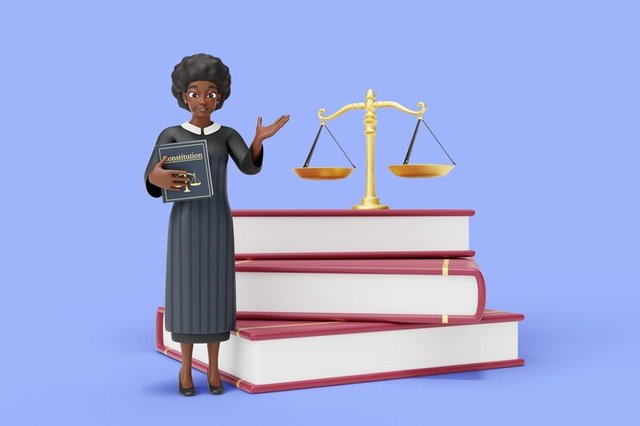SLC22-W1 / Basic Notions of Law.
Every country has a law that enforces rules and regulations in the country. Basic Notions of Law which is a learning challenge organised by @anasuleidy is what I am here to present.
Part I
-. Say in your own words and based on what was explained in class: What is law?
 |
|---|
In a layman's understanding, a law is a rule that is created and enforced by the government to maintain order, settle disputes, and make everyone in a society live without causing nuisance. Without law, it would be difficult for us to have social coexistence wherever we may find ourselves.
With that being said, it means that the law is the set of norms and rules that regulate the relationships of people in our society. The purpose of the law is to protect the rights and freedoms of individuals, resolve disputes (conflicts), regulate social interactions, maintain social order, and as well promote justice and fairness among the rich and poor which without law the poor would consistently be oppressed by the rich.
-. Considering the explanations given in class, according to the law and the laws of your country, I pointed out two examples of "Objective Law" and two examples of "Subjective Law".
An Objective Law: This is of fairness, meaning law should be clear based on rational principles to ensure that justice is well delivered. In Nigeria, objective law is the body of legal principles and rules that universally apply across the 36 states of Nigeria regardless of emotions or personal opinions.
The law is designed to treat all individuals in Nigeria equally without bias or favoritism in the country. In conclusion, Nigeria's objective law is communicated to everyone within and outside the country to understand their responsibilities and rights in the country.
Examples:
It is the laws that define crimes such as assault, stealing (theft), etc, and their punishment (penalties). The law also states the regulations on contracts between parties who want to do business in case there is a breach of contract. The law of human rights guarantees the freedom of speech and equality in Nigeria. Without an objective law in Nigeria, freedom of speech and equality wouldn't have been possible in Nigeria.
A Subjective law: Is the type of law that doesn't support bias but supports personal opinions, and feelings. In this type of law fair hearing is been given to whosoever is been a judge before decisions can be taken by the appropriate authorities
Examples:
In Nigeria, we have moral-based law which is rules based on some religious values and cultural differences. In this type of law before penalties are decided or an issue is resolved there must be a personal interpretation from the offender.
-. Based on what you have learned, please state in which part of the case Objective Law and Subjective Law are present.
 |
|---|
Based on what the two laws stand out to define and protect, the objective law of the traffic light states that all drivers irrespective of social difference must stop when a red light is on. The law is for all drivers irrespective of their circumstances in life which simply implies that the driver has violated an objective law for not stopping at the red light.
According to the driver, he knows the law very well, but he still claims to have disregarded the traffic light because of the emergency involving his sick child who is in school. Subjective law is the law that would resolve the dispute if the officer on duty considers the emergency as a valid jurisdiction, the decision of the case may then be given reasonable action if the driver is telling the truth.
-. Based on what you have explained in class, make a comparison according to the law of your country. Give an example of a law and an example of a norm.
Comparison:
As we have learned law is created and enforced by government authorities through legal means which if violated by citizens can result in legal consequences like imprisonment, punishment for violation, or paying of fines.
 |
|---|
Norm is simply a standard of behavior or rule that is established by cultural or social agreement to promote and protect the culture of a society. In Nigeria, if a person should violate the norm of a society the person will be meant to face the legal consequences in the society. In some communities, one can be banished or meant to dance naked at the market Square.
Case study of Mr. Juan Perez
If we have to look at the case of Mr. Juan Perez in Nigeria it is a case of tenancy laws of the state. In Nigeria, tenants are obligated legally to pay their rent as agreed and negotiate in the contract with the landlord or landlady failure to do so can result in legal action or eviction of the tenant by his or her landlord or landlady.
In this case, Mr. Juan Perez has to pay his three months' rent which is part of his agreement with his landlord before he parks into the house, also, the landlord has the right to take Mr. Juan Perez to the court as it is legally or he can decide to evict him according to the tenancy laws of Nigeria.
Norm Violation:
In Nigeria, every society or community has a rule when it comes to building a house which every landlord ought to follow to avoid community disputes. Now in the case of Mr Juan Perez, he has violated the rules of the community and the building he is living in for bringing dogs which is against the rules.
It is no longer a law but a violation of community or social norms is what he has committed if it is in my community Mr Juan Perez would be asked to pay a fine by the landlord or community head.
-. Explain in your own words what importance Comparative Law has for you according to what you have seen in class.
To me, I like comparative law because it helps to bridge the gaps between legal systems, and helps help and everyone to think about the role of law in a society that fosters innovation. Also, It is important to me because it helps me to understand how laws in my country, function. In summary, the importance of comparative law for me is how it fosters cooperation, and personal growth and solves cross-border issues.
I am inviting; @dove11, @simonmwigwe, and @ruthjoe